Ajax Fibra
Ajax innovations have reached a new level. Contrary to the technology from the 80s that is still present in the security industry, our engineers have developed Fibra — a digital-generation wired technology. Fibra combines the reliability of wires with the freedom of radio connection. An ordinary four-core cable, coupled with Fibra, demonstrates absolutely unordinary features.
Up to 2,000 meters of connectivity, compatibility with all types of devices, 60 hours of operation of a system consisting of 30 devices on a backup battery, advanced anti-sabotage, photo verifications, instant notifications, hassle-free installation and remote configuration through an app — everything that was possible in wireless Ajax is now available with wires and Fibra.
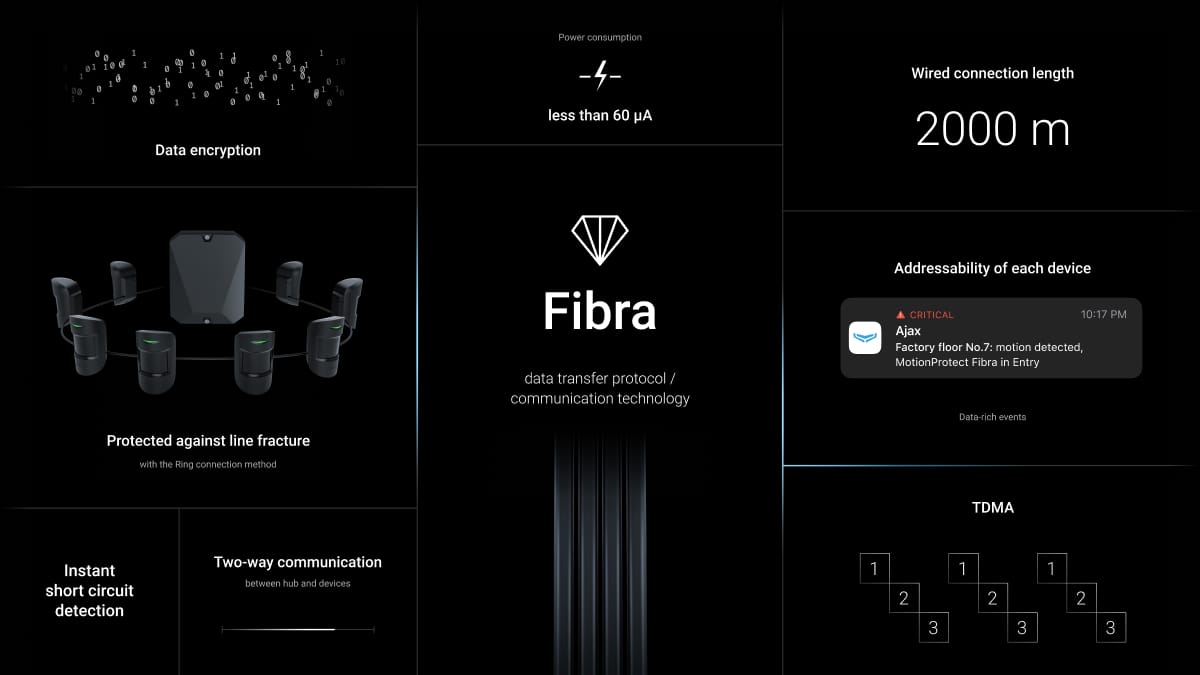
Fibra technology at a glance
Wireless experience in a wired connection
At the physical level, Fibra looks like a bus connection: detectors are connected to a control panel with a four-core cable. However, the real revolution is hidden at the software level. Fibra communication protocol has inherited all the advantages of Jeweller radio technology; it requires minimum power for two-way packet data transmission. This feature provides more freedom when installing the system compared to both the analog and digital solutions available in the market.
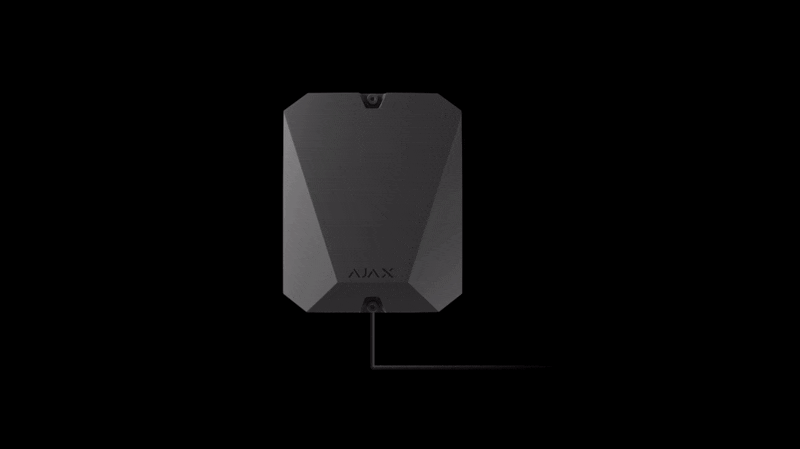
One Fibra line can connect one detector or dozens of various detectors, sirens, and keypads in any combination. MotionCam Fibra detectors are no exception. You don’t need a separate cable to receive photo verifications. They are transmitted over the same line that the system devices use to communicate events. In the Ajax app, devices are organized by rooms and groups, regardless of their physical connection to a hub. This means the security system has both physical and digital architecture.
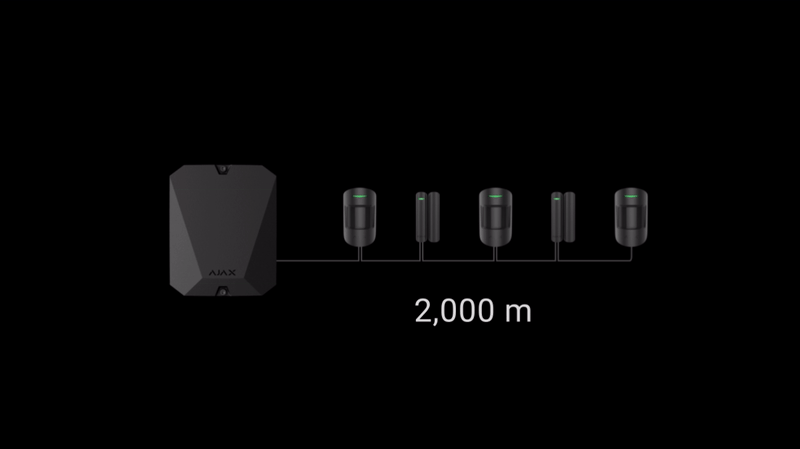
Multiple Fibra lines allow the wiring to go by a convenient and safe route and then adjust the digital architecture of the system in the PRO app. With such flexibility and a 2 km of length margin, no matter whether you’re protecting a multi-floor building or several buildings, you don’t need to complicate your system with signal amplifiers or additional power supplies.

Permissible Fibra line length compared to industry average wire length
The Fibra communication protocol logic ensures collision protection: even 30 detectors connected to one line will communicate steadily even while being triggered simultaneously. Alarms are transmitted in 0.15 seconds.
Unprecedented energy efficiency
Thanks to Fibra, the detectors consume tens of microamperes. That’s 100 times less than the industry average for digital wired detectors. This low power consumption allows more devices to be connected with a single line and enables longer wired connections. This is due to the logic of the protocol that inherited the key Jeweller features.
Fibra communication is organized according to the TDMA principle. Each device is allotted a short time frame to exchange data with a hub. The rest of the time, their communication modules are inactive. This significantly reduces power consumption and helps avoid interferences even when multiple devices communicate simultaneously.
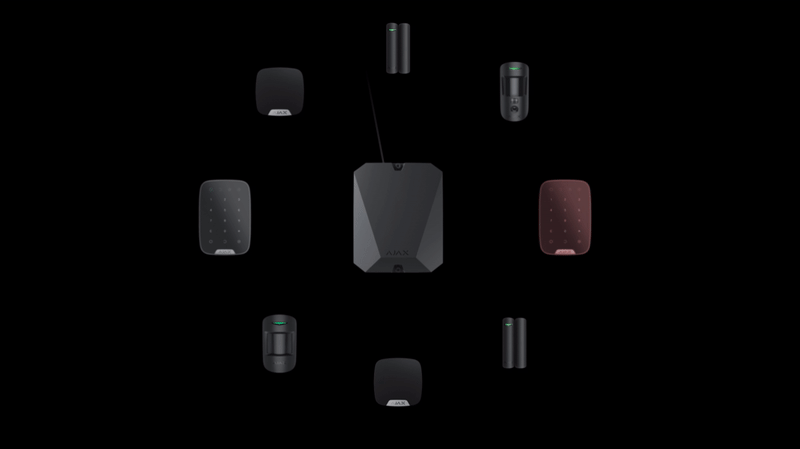
Time slots are organized so that alarms are transmitted instantly. If the detector does not respond, the hub repeats the request twice more, and then notifies the users and the security company about the device loss.
The result is outstanding system autonomy in case of a blackout. 30 wired Fibra devices will run for 60 hours on a 7 Ah backup battery. This is 5 times more than Grade 2 requires, and meets the Grade 3 requirements.
Advanced antisabotage
To protect the transmitted data, Fibra uses encryption featuring a dynamic key. Hacking and getting to the data will take enormous computing power and time. In other words, it is a futile effort. However, even encrypted data still needs to be reached. Each communication session between a hub and a device begins with authentication: unique markers and properties are compared. If at least one parameter fails the verification, a hub ignores the device commands. Therefore, there is no point in tampering or intercepting data.
An Ajax system constantly monitors its status: a hub polls the connected devices at the shortest possible regularity, automatically determined by the system.. The voltage on each device is monitored. If the line is damaged and power starts to drop, you will receive a notification as well. The system instantly detects a short circuit on the line and notifies the monitoring station and the users. And when the problem is fixed, there is no need to replace the fuses: the system will restore operation automatically.
Moreover, the upcoming OS Malevich update will enable physical protection of the Fibra line from being broken. To do this, connect the beginning of the line to one hub terminal and its end to the other. Such a connection creates a ring topology. In case of a line fault, the ring splits into two working segments, a security company and users are notified of the incident.
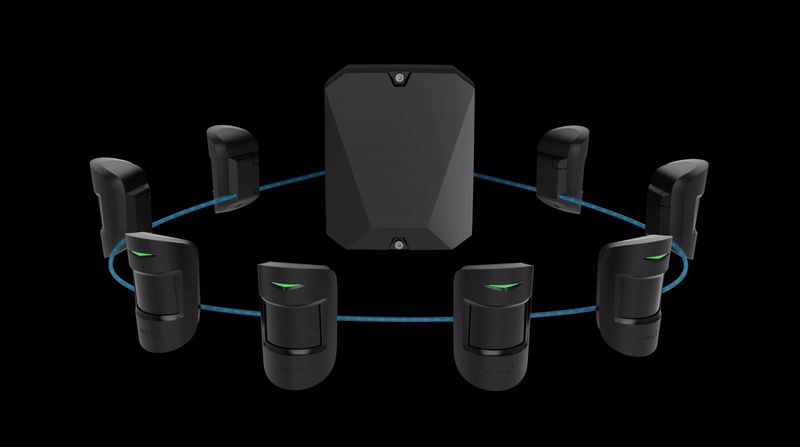
Fibra supports the ring connection topology. With Hub Hybrid, there can be up to 4 rings in the system.
New features in PRO apps
Fibra has fully inherited the Ajax wireless user experience. Apps notifications contain comprehensive information: the event type, date, time, the detector name, the placement room. Due to the addressability of devices, you know exactly what is happening in the system and at the facility - even if a dozen detectors are connected to one line. Add to this the MotionCam motion detector photo verifications, and you get maximum system informativeness and control at your fingertips.
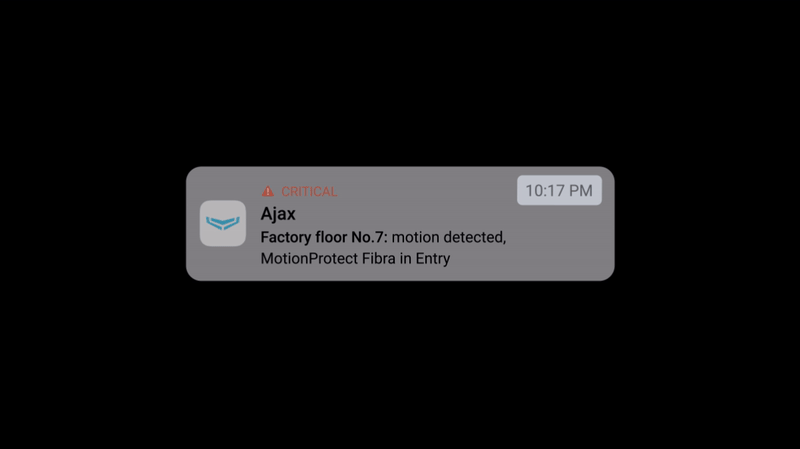
To simplify the Fibra wired devices installation, we have developed special software tools. The line scan function automatically finds devices not assigned to the hub and allows adding them to the system — in just a couple of clicks.
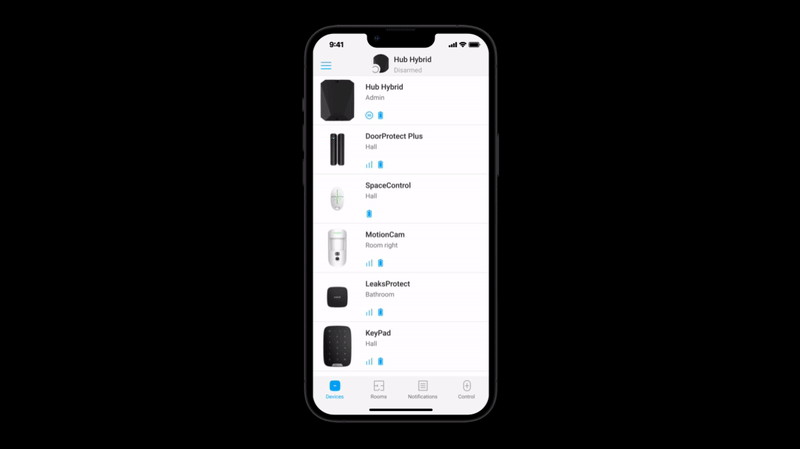
The Fibra line scanning interface in the Ajax PRO app.
The built-in stress test of power consumption helps ensure that the system has sufficient power in any scenario. After installing the system, the installation engineer uses the PRO app to simulate the maximum possible power consumption: detectors give alarms, keypads are activated, and sirens are turned on. If the system passes the test, it will have sufficient power in any case.
If you use an integrated PRO Desktop app to monitor Ajax systems, the list of convenient features is supplemented with automatic system synchronization. After the installation and setup process, all Ajax equipment configuration is automatically downloaded from the cloud server. The monitoring station engineer does not waste time on the manual transfer of devices, which eliminates mechanical errors.
Fibra stands for flexibility, reliability, and control. As part of the Ajax ecosystem, new wired technology has made a consistent user experience possible, regardless of the connection between the devices and the hub. Efficient hardware and sophisticated software laid the foundation for the development of another Ajax product line setting a new standard in the security industry.
